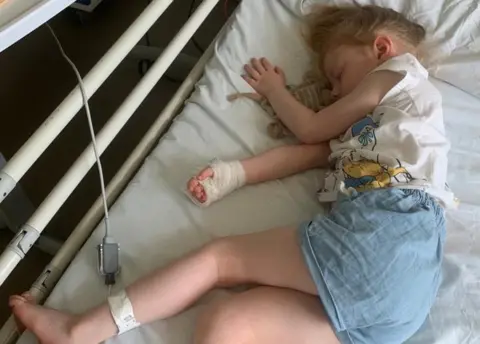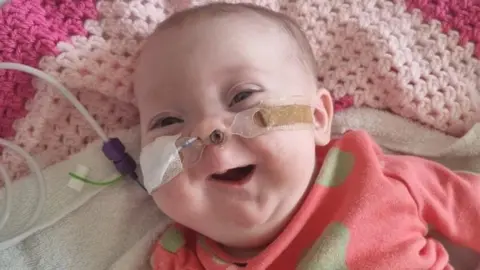Kettering hospital ward accused of failing children rated inadequate
 Michaela Stevens
Michaela StevensThe safety of a ward accused of failing children has been rated as inadequate by inspectors.
The care regulator warned Kettering General Hospital (KGH) in Northamptonshire over its children's and young people's services.
Inspectors' worries include sepsis treatment, staff numbers, dirt levels and not having an "open culture" where concerns can be raised without fear.
The trust's chief executive apologised to those who felt let down.
Since the BBC's first report in February highlighting the concerns of parents with children who died or became seriously ill at KGH, dozens more families have come forward, bringing the number to 50 to date.
Michaela Stevens told the BBC she contacted the Care Quality Commission (CQC) over complaints about her son Archie's care on Skylark paediatric ward in November.
She believed her then 17-month-old son - who lost 500g (1.1lbs) on Skylark - was "lucky to be alive".
In December, the CQC inspected the paediatric assessment unit, Skylark ward and the neonatal unit after hearing concerns of safety and rated the service inadequate, the lowest possible.

Inspectors found that "staff did not always effectively identify and quickly act upon patients at risk of deterioration".
They said there were sometimes "delays in medical reviews being undertaken outside of normal working hours", highlighting one case where a seemingly deteriorating patient was not seen until three hours after being escalated to the on-call team.
Charlotte Rudge, CQC deputy director of operations in the Midlands, said inspectors found "the trust had ineffective systems in place to assess and treat people at risk of sepsis".
"We were informed of an incident where someone who developed sepsis hadn't had a sepsis screen for over seven hours after arrival at the hospital, which is totally unacceptable."
The report said the paediatric sepsis lead role had been vacant for eight months at the time of the inspection.

Other findings included:
- Inspectors were concerned about a potential risk of missing a child who needed to be safeguarded because records did not correlate
- There were not enough nursing or medical staff, with key nursing leadership positions being vacant
- Wards were not always clean, including a "significant amount of brown dirt" on bathroom doors, dirt in shower areas and behind toilets, and dust on cot rails
- There was not always an "open culture where patients, their families and staff could raise concerns without fear"
The CQC said some issues raised by them in 2017 remained, including concerns around paediatric life support training levels and over governance.
"Leaders did not have a robust oversight of the service at the time of our inspection to ensure the service was being effectively managed," inspectors said.
"We found limited progress had been made to improve the quality and safety of the service."
The CQC issued a warning notice to make improvements on "multiple areas", including medicines management, identification and treatment of sepsis, safeguarding processes and learning from serious incidents.

Olivia's story
 Family photo
Family photoOlivia was born with a cyst on her neck which obstructed her breathing, and after having it removed at Great Ormond Street Hospital (GOSH), she was transferred to KGH.
Her parents, Lee Dooley and Lesley Fishwick, from Corby, said Skylark did not change her breathing tube, which is due to be changed weekly, during her seven-week stay.
Meanwhile, they said Olivia's condition started to worsen and she started vomiting.
Her parents said they signed a consent form before the breathing tube was eventually removed on 28 March.
But that day Olivia went into cardiac arrest and her parents were told she stopped breathing for between seven and 14 minutes.

She was eventually revived with assistance from doctors from Nottingham, but has since become unresponsive, according to her parents, and is being cared for at GOSH.
Ms Fishwick said Skylark staff "were just not interested" in getting the breathing tube changed, adding: "It was like banging your head against a brick wall - they just wouldn't listen."
Her partner added: "She's not going back to Kettering - not happening.... GOSH said that as well. They said they wouldn't send her back there. She's not safe there."
The hospital said it was unable to comment on individual cases.

During the inspection the CQC also visited the paediatric emergency department (PED), rating that service as requiring improvement and stated: "The service did not have a vision for what it wanted to achieve."
The trust's chief executive, Deborah Needham, said: "We accept the findings of [the] CQC report and the clear message it contains of the need to significantly improve the way we deliver children and young people's services.
"I would like to sincerely apologise to any families who feel they have been let down by our services.
"Immediately after the CQC's inspection in December we launched a comprehensive improvement programme to look at the issues raised and decide how we can resolve them."
The hospital said it had increased staff training around sepsis, given "additional focus" to identifying deterioration and recruited more staff, including a new head of nursing.
The trust's new director of nursing, Jayne Skippen, along with its new medical director, are leading the improvement programme.
Ms Skippen said: "The CQC found we have not always embedded improvements to our systems and processes and that is a major concern for us and an area we will continue to focus on.
"We are improving the way we oversee changes and how we assure ourselves that changes have been effective. We want to work with our staff, our patients and their families to develop good communication and a strong culture where safety comes first."

Find BBC News: East of England on Facebook, Instagram and Twitter. If you have a story suggestion email [email protected]
